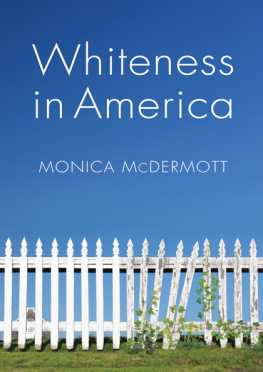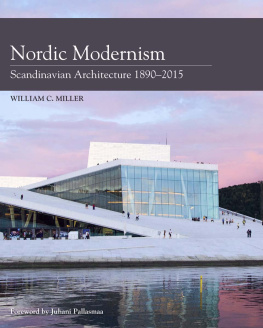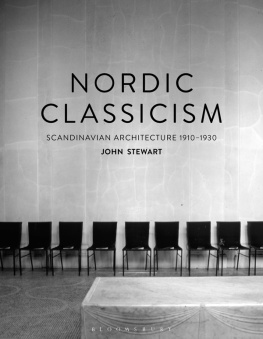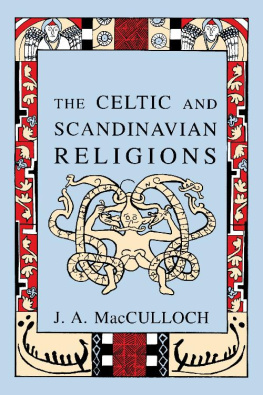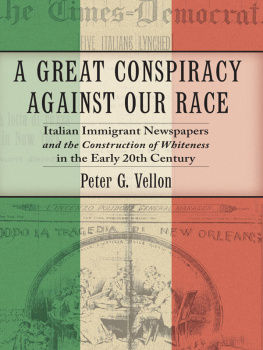Publication of this book was supported by funding
from Colorado Mesa University Social and
Behavioral Sciences Department.
2019 by the Board of Trustees
of the University of Illinois
All rights reserved
Library of Congress Cataloging-in-Publication Data
Names: Jackson, Erika K., 1978 author.
Title: Scandinavians in Chicago: the origins of white privilege in modern America / Erika K. Jackson.
Description: [Urbana, Illinois]: University of Illinois Press, [2019] | Includes bibliographical references and index.
Identifiers: LCCN 2018018108| ISBN 9780252042119 (hardcover : alk. paper) | ISBN 9780252083822 (pbk. : alk. paper)
Subjects: LCSH : Scandinavian AmericansIllinoisChicago. | Scandinavian AmericansRace identityIllinoisChicago. | WhitesRace identityIllinoisChicago.
Classification: LCC F 548.9.S18 J33 2019 | DDC 977.3/11004395dc23 LC record available at https://lccn.loc.gov/2018018108
Ebook ISBN 978-0-252-05086-2
Cover illustration: Miss Norway Pageant contestants at the Worlds Fair (University of Illinois at Chicago Library). Worlds Columbia Exposition, Chicago, 1893. (C. D. Arnold, photographer).
Acknowledgments
In the course of this project, I have benefited from the guidance and support of countless colleagues, archivists, family, and friends. It is with sincere gratitude that I acknowledge some of them here.
My motivation in writing this book began out of a desire for self-identity. Growing up as an adopted child, I listened intently to stories my Grandpa Swanson told of his ancestors from Sweden. My family accepted me as one of their own; there was never a question that I was not also Swedish. When I grew older, I began to understand that ethnicity is not something you simply adopt by proximity. All my life I noted a distinct sense of interest whenever I told someone that I was Swedish. I became fascinated with this sense of privilege, though why was my perceived ethnicity a point of interest? Some questions people asked exposed American stereotypes regarding race: If your family is Swedish, then why dont you have blonde hair? I was often afraid that questions like these would expose me as an adopted Swede, rather than a biological one. Then again, why did it matter? Years later, my mom would come across my adoption paperwork, which indicated I was Norwegian, not Swedish. As one can imagine, it created quite the renegotiation of identity.
Because many of our ancestors lived in Chicago during the early twentieth century, I also wanted to live there and learn more about them. My graduate advisors, Susan Hirsch and Lewis Erenberg, introduced me to the work of professional historians and instilled in me a love of archives. I had the privilege of working as an intern and museum educator at the Swedish American Museum, which made my interest in my familys past grow even more. Years later, I went on to pursue my PhD at Michigan State University, and it was there that my interest in the history of Scandinavians in Chicago deepened. At MSU, I had the opportunity to work with outstanding scholars and mentors. The late David Bailey inspired me to go further and think deeperI miss him deeply. I am grateful for my colleagues, Kate Caccavaio, Jason Friedman, Ted Mitchell, and Elise Wagner McCurties, who encouraged me to keep going and to escape the confines of Morrill Hall, and to Dionicio Valdes, who bravely took a group of us to Vxj, Sweden, as part of a scholar exchange. I owe a special and profound gratitude to my graduate advisor, Lisa Fine, who first ignited my love for history as an undergraduate at Michigan State. There is no one in my professional life whom I respect or admire more than Lisa. She demonstrates that it is possible to achieve a balanced academic and personal life and taught me how to be a professor and a historian. Morrill Hall is gone, but I will always treasure my time there.
At my current position as associate professor of history at Colorado Mesa University, I am grateful to work with a dynamic community of teacher-scholars. Over my years at CMU, my historian colleagues have provided me with comradery, support, and guidance through this process: Sarah Swedberg, Steve Schulte, Adam Rosenbaum, Vince Patarino, Doug ORoark, and Justin Liles. I thoroughly appreciate all of my fellow colleagues who imparted camaraderie along the path to tenure and promotion. Jay Ballenberger graciously accepted my offer to give my manuscript another look through the eyes of a librarian, Steve Merino and Brenda Wilhelm provided sociological insight, Michelle Sunkel shared coffee and laughter, and Tim Casey instilled encouragement during lunchtime visits. Finally, I would like to thank my students at Colorado Mesa for always challenging me to think differently and for inspiring me with your growth.
Through the life of this project, I have benefited from multiple sources of financial support: Colorado Mesa Universitys Faculty Professional Development Fund; Trans-Atlantic Summer Institute at the University of Minnesota; the Dagmar and Nils William Olsson fellowship at the Swenson Swedish Immigration Research Center; and the Department of History at Michigan State University. Jessica Herrick, department head of the social and behavioral sciences at Colorado Mesa, graciously provided funds to help with the completion of this book. I would like to thank the many archivists and librarians who helped me navigate archival collections for this project. Thank you to Steve Spencer, Anna-Kajsa Echague, and Anne Jenner at the Swedish-American Archives of Greater Chicago at North Park University for the painstaking efforts you put into helping me locate materials, gather permissions, and select images. The staffs at Augustana Colleges Swenson Swedish Immigration Research Center; Newberry Library; Kenilworth Historical Society; and Pacific Lutheran University Archives and Special Collections were essential.
My books argument deepened through the insight of fellow colleagues at conferences and seminars over the years who motivated me to formulate and share my research, including conferences held by the Society for the Advancement of Scandinavian Studies, Social Science History Association, and Loyola University Chicago. I am indebted to Dag Blanck and Daron Olson, who at the SASS conference in 2013 gave me the courage to submit my book proposal to the University of Illinois Press. UIP was my first choice and when I sent my book proposal to acquisition editor Dawn Durante, admittedly, I thought my goal was a long shot. She gave me the greatest thrill of my professional career by responding that she wanted to read more. This process has undoubtedly made me a better writer and I have her to thank for that. Dawn, you are everything I could have asked for in an editor. I am highly appreciative of the work my two external reviewers put into the final stages of the book. They provided me with tangible feedback, employed depth and focus, but also were kind and supportive.
I owe my success and completion of this book to my friends and family, who are too numerous to list. I have immense gratitude for Amanda Bynum and Betsy Chafee, who are stunning; and for Rick Northrup and the Martinich family, who have always supported my work. To my parents, Jeff and Kathy Jackson, who, admittedly, did not agree with my decision to attend graduate school in the first place and gave me the shock of my young adult life when they refused to pay for my continued studies. I love and respect them every day for giving me the harsh dose of reality I needed in order to grow up and achieve my goals on my own. In the process of this project, I gained two of the best in-laws anyone could ask for, Rick and Tamara, who welcomed me into their family with open arms.



